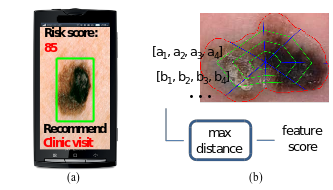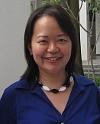Mobile Imaging System for Early Diagnosis of Skin Cancer
By Ngai-Man (Man) Cheung and Dawn Koh
A mobile imaging system has been studied for early diagnosis of skin cancer. It computes visual features from a user-captured skin lesion image, and analyzes them to estimate the likelihood of malignancy, using an off-the-shelf smartphone. New resource-constrained image analysis algorithms and user-friendly software design have been used for this application. The research advances knowledge concerning best design practices for disease diagnosis systems using smartphones and imaging algorithms.
Increasingly, mobile phones are equipped with multi-core CPUs and high resolution image sensors. All this creates the opportunity to use a mobile phone to analyze a captured image for disease diagnosis and self-screening. In this project, we research a novel mobile imaging application for early detection of skin cancer (Fig. 1(a)).

Figure 1: Figure 1. (a) Mobile imaging system for early diagnosis of skin cancer running on an off-the-shelf Android smartphone. (b) Our proposed feature to quantify color variation of a skin lesion.
Skin cancer is one of the most common cancers in Caucasians [1]. It is also one the fastest growing cancers globally, with steadily increasing incidence over the past 30 years. In Singapore, there is a trend towards more advanced disease staging at presentation due to lack of patients’ awareness and delayed or missed diagnosis by primary care physicians [2]. There is a pressing need for an accessible and accurate prescreening solution to improve the general awareness.
Our project focuses on two main areas. First, we research image processing and analysis techniques to compute the morphological and chromatic features in the skin lesion image captured by the phone. Based on these features, our system mathematically estimates the likelihood of skin cancer. Our research advances state-of-the-art and proposes new low-complexity image analysis algorithms suitable for power-constrained mobile devices. Specifically, we develop low-CPU-usage, low-memory-footprint image segmentation to localize the skin lesion region. We compute novel visual features useful for skin cancer diagnosis, namely shape asymmetry, border irregularity, color variation and texture characteristics of the lesion (Fig. 1(b)). Using these features, we perform support vector machine (SVM) based classification to estimate the malignancy.
Secondly, as many skin cancer patients are elderly, we research user-friendly mobile software design for this application in older individuals, who may have visual, physical and cognitive issues. Our research applies the principle of User-Centered Design [3] to identify and address the needs, expectations and limitations of older users. We investigate various topics relevant to mobile app usability for the elderly, ranging from multi-modal feedback, gesture limitation to augmented functionalities. As an example, we propose a novel image CAPTCHA technology to facilitate the use of our system in older patients.
We have developed a baseline prototype running on an Android smartphone. We have obtained promising preliminary results based on a dataset provided by NSC [4].
Our project combines computation, biology, design, medical science and healthcare research expertise. Our holistic and inter-disciplinary approach is crucial for this important healthcare problem. Our work also advances knowledge concerning best design practices for mobile diagnosis systems potentially applicable to other diseases.
Acknowledgements
This research is in collaboration with:
SUTD: Dothanh Toan, Yiren Zhou, Haitian Zheng, Hossein Nejati and Prof. Ricardo Sosa National Skin Center – Singapore (NSC): Dr. Suat-Hoon Tan, Dr. Martin Chio, Dr. Michelle Liang, Dr. Aaron Tan Stanford University Medical Center and Cancer Institute: Prof. Susan Swetter
The material reported in this document is supported by the SUTD-MIT International Design Centre (IDC). Any findings, conclusions, recommendations, or opinions expressed in this document are those of the author(s) and do not necessary reflect the views of the IDC.
For Further Reading
1. “American Cancer Society. Cancer Facts & Figures 2013”. Atlanta: American Cancer Society; 2013.
2. H. Y. Lee, et al., “Melanoma: Differences between Asian and Caucasian Patients,” Ann Acad Med Singapore 2012; 41: 17-20.
3. D. A. Norman and S. W. Draper, User-Centered System Design: New Perspectives on Human-Computer Interaction. Erlbaum, Hillsdale, NJ, 1986.
4. Thanh-Toan Do, Yiren Zhou, Haitian Zheng, Hossein Nejati, Ngai-Man Cheung, Dawn Koh, Ricardo Sosa, Suat-Hoon Tan, Martin Chio, Michelle Liang, Aaron Tan, and Susan Swetter, “Design of a Mobile Imaging System for Early Diagnosis of Skin Cancer,” IEEE Life Sciences Grand Challenges Conference 2013.
Contributors
 Ngai-Man (Man) Cheung is an Assistant Professor at Singapore University of Technology and Design (SUTD). He received his Ph.D. degree in Electrical Engineering from University of Southern California (USC), Los Angeles, CA. His research interests are image processing and image analysis with application to healthcare. Read more
Ngai-Man (Man) Cheung is an Assistant Professor at Singapore University of Technology and Design (SUTD). He received his Ph.D. degree in Electrical Engineering from University of Southern California (USC), Los Angeles, CA. His research interests are image processing and image analysis with application to healthcare. Read more
 Dawn Chin-Ing Koh is a biomedical scientist with specific interests in neuroscience and cancer research. She has extensive experience using both in vitro (cell lines) and in vivo (mouse models) studies in her research. Read more
Dawn Chin-Ing Koh is a biomedical scientist with specific interests in neuroscience and cancer research. She has extensive experience using both in vitro (cell lines) and in vivo (mouse models) studies in her research. Read more







 Y. Sun (M'13) is a Research Fellow in the Singapore Institute for Neurotechnology (SINAPSE) at the National University of Singapore. Dr. Sun received his PhD degree in Electronics, Electricals, and System Engineering from Loughborough University, UK, in 2011 and the PhD degree in Biomedical Engineering from Shanghai Jiao Tong University, China, in 2012 respectively.
Y. Sun (M'13) is a Research Fellow in the Singapore Institute for Neurotechnology (SINAPSE) at the National University of Singapore. Dr. Sun received his PhD degree in Electronics, Electricals, and System Engineering from Loughborough University, UK, in 2011 and the PhD degree in Biomedical Engineering from Shanghai Jiao Tong University, China, in 2012 respectively.  J. Sun (M'10) is an assistant professor of School of Biomedical Engineering, Shanghai Jiao Tong University, China. He received the PhD degree in Electronic and Information Engineering from The Hong Kong Polytechnic University in 2009. His research interests include neuroimaging, brain network modeling, and their applications in stroke, mental disorders and Alzheimer's disease.
J. Sun (M'10) is an assistant professor of School of Biomedical Engineering, Shanghai Jiao Tong University, China. He received the PhD degree in Electronic and Information Engineering from The Hong Kong Polytechnic University in 2009. His research interests include neuroimaging, brain network modeling, and their applications in stroke, mental disorders and Alzheimer's disease.  Nitish V. Thakor (F'97) is a Professor of Biomedical Engineering at Johns Hopkins University, Baltimore, USA as well as the Director of the newly formed institute for Neurotechnology, SINAPSE, at the National University of Singapore. His research interests are neuroengineering, neuroprosthetics, brain machine interfaces, neurochips and devices, and clinical and translational applications.
Nitish V. Thakor (F'97) is a Professor of Biomedical Engineering at Johns Hopkins University, Baltimore, USA as well as the Director of the newly formed institute for Neurotechnology, SINAPSE, at the National University of Singapore. His research interests are neuroengineering, neuroprosthetics, brain machine interfaces, neurochips and devices, and clinical and translational applications.  Anastasios (Tassos) Bezerianos (SM'08) is a Research Professor in the ECE, National University of Singapore and Senior Principal Research Fellow of Singapore Institute for Neurotechnology (SINAPSE) and Professor at the Medical School of Patras University, Greece. His research interests at large are in Neuroengineering and Systems Medicine and Bioinformatics.
Anastasios (Tassos) Bezerianos (SM'08) is a Research Professor in the ECE, National University of Singapore and Senior Principal Research Fellow of Singapore Institute for Neurotechnology (SINAPSE) and Professor at the Medical School of Patras University, Greece. His research interests at large are in Neuroengineering and Systems Medicine and Bioinformatics.  Haoyong Yu is an Assistant Professor of Department of Biomedical Engineering at NUS. He received his PhD in Mechanical Engineering from MIT in 2002. His current research at NUS focuses on robotics for neurorehabilitation, assistive technologies, robotics in surgery, and bio-inspired robots.
Haoyong Yu is an Assistant Professor of Department of Biomedical Engineering at NUS. He received his PhD in Mechanical Engineering from MIT in 2002. His current research at NUS focuses on robotics for neurorehabilitation, assistive technologies, robotics in surgery, and bio-inspired robots.  Chen Gong is currently working towards the Ph.D. degree in Biomedical Engineering, NUS with his supervisor Dr. Yu Haoyong. His current research interests include rehabilitation robots system, compliant actuator and control theory.
Chen Gong is currently working towards the Ph.D. degree in Biomedical Engineering, NUS with his supervisor Dr. Yu Haoyong. His current research interests include rehabilitation robots system, compliant actuator and control theory.  Guo Zhao is a Research Fellow in the Department of Biomedical Engineering, National University of Singapore. He received his Ph.D. degree in Mechatronics Engineering from the Institute of Robotics, Shanghai Jiao Tong University, China, in 2012. His research interests include neurorehabilitation exoskeleton, neuromuscular modeling, and neuromuscular-model based robotic control.
Guo Zhao is a Research Fellow in the Department of Biomedical Engineering, National University of Singapore. He received his Ph.D. degree in Mechatronics Engineering from the Institute of Robotics, Shanghai Jiao Tong University, China, in 2012. His research interests include neurorehabilitation exoskeleton, neuromuscular modeling, and neuromuscular-model based robotic control.  Ngai-Man (Man) Cheung is an Assistant Professor at Singapore University of Technology and Design (SUTD). He received his Ph.D. degree in Electrical Engineering from University of Southern California (USC), Los Angeles, CA. His research interests are image processing and image analysis with application to healthcare.
Ngai-Man (Man) Cheung is an Assistant Professor at Singapore University of Technology and Design (SUTD). He received his Ph.D. degree in Electrical Engineering from University of Southern California (USC), Los Angeles, CA. His research interests are image processing and image analysis with application to healthcare.  Dawn Chin-Ing Koh is a biomedical scientist with specific interests in neuroscience and cancer research. She has extensive experience using both in vitro (cell lines) and in vivo (mouse models) studies in her research.
Dawn Chin-Ing Koh is a biomedical scientist with specific interests in neuroscience and cancer research. She has extensive experience using both in vitro (cell lines) and in vivo (mouse models) studies in her research.